Big O
Dave Grohl on life after Nirvana.
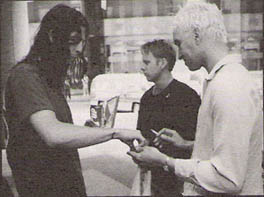
Big O
Dave Grohl on life after Nirvana.

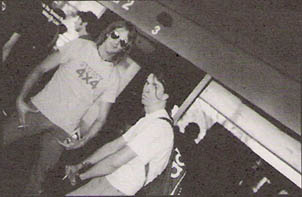 The promotional trek for the release of 'Foo Fighters' has now led to Asia, where Grohl and I met on the evening of Jan 16, 1996, barely an hour before the Foo Fighters were to take to the stage opening for Sonic Youth in Singapore. To the horror of the EMI publicist, Grohl suggested that we do the interview informally, outside his dressing room, and then he proceeded to sit on the floor out in the corridor. He even ground out his cigarette on the carpet as we talked. I was impressed. The following interview transpired. There's indeed a way to Nirvana, even in boring old Singapore. Try that one.
The promotional trek for the release of 'Foo Fighters' has now led to Asia, where Grohl and I met on the evening of Jan 16, 1996, barely an hour before the Foo Fighters were to take to the stage opening for Sonic Youth in Singapore. To the horror of the EMI publicist, Grohl suggested that we do the interview informally, outside his dressing room, and then he proceeded to sit on the floor out in the corridor. He even ground out his cigarette on the carpet as we talked. I was impressed. The following interview transpired. There's indeed a way to Nirvana, even in boring old Singapore. Try that one.
GERRIE LIM: So here we are, as the 1996 MTV Alternative Nation Tour goes through Asia. What are your thoughts on this trip so far?
DAVE GROHL: Well, so far we've only played Jakarta and we spent three days there. Everyone had sort of raised our expectations to look forward to this crazy place where people were hurting each other and being caned and there would be dogs and police (laughs) but actually it's really tame, really mellow. So we were sort of surprised because everyone had built it up to being this crazy riot situation and it wasn't. So it was actually pretty nice and all the people have been so cool.
GERRIE: Looking back on your debut Foo Fighters record and the fact that three of the songs were written after Kurt (Cobain) died, I just wondered what you thought about how people might've read into your lyrics. With lines like, "This is a call to all my past resignations," what those past resignations are, and all that. I wondered if any of that has filtered through your own consciousness in terms of what people are extrapolating.
DAVE: Well, definitely, but it's strange because that kind of thing isn't intentional. For me, I don't really put much emphasis on lyrics. And I was explaining to someone today that one of the reasons music is sort of a universal language is the sound of the instruments and the sound of the voice and the mood that you create through tones and frequencies, rather than what you're actually saying, you know.
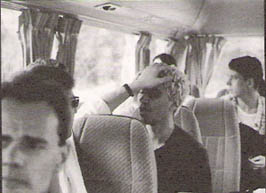 A lot of times, you can say more with the mood of the song than you can with the lyrics, so I've never really put much emphasis on lyrics. When I'm in the studio and I'm writing lyrics, I usually write them five minutes before. I think of things phonetically and I try to make things rhyme, like "I need to find a word with this many syllables," and the producer's saying, "C'mon, let's go! C'mon, write some lyrics!" and I'm scribbling things down. So it's not intentional if any of that is subliminal. Of course, a lot of the times those are the most revealing lyrics. Because the more you think about something, the less pure it becomes.
A lot of times, you can say more with the mood of the song than you can with the lyrics, so I've never really put much emphasis on lyrics. When I'm in the studio and I'm writing lyrics, I usually write them five minutes before. I think of things phonetically and I try to make things rhyme, like "I need to find a word with this many syllables," and the producer's saying, "C'mon, let's go! C'mon, write some lyrics!" and I'm scribbling things down. So it's not intentional if any of that is subliminal. Of course, a lot of the times those are the most revealing lyrics. Because the more you think about something, the less pure it becomes.
GERRIE: Are you talking with Krist (Novoselic) at all about maybe working together again, or is that a total non-possibility?
DAVE: No, we definitely are talking. He has his own band now and. he also works with a few political organisations so he's extremely busy. I think that I'll never rule out the possibility that we'll play together again, just because when you've been with someone for four years, you can't just draw the line and stop. We'll both probably play with each other in the next, who knows, (shrugs) 10 years? I don't know.
GERRIE: What do you think now about the cultural legacy of Nirvana and what you're doing with the Foo Fighters?
Is there any congruence in terms of how the two exist culturally?
DAVE: Well, I'm not one to put so much thought into it that I can "understand" the cultural importance of Nirvana. Because to me it was just a really fun band to play drums in. And
it's hard a lot of the time. It's like having someone do their impression of you. It's like an impersonation of you, and it's strange. When you hear your own voice on a tape recorder,
you always say, "Oh, that doesn't sound like me." So it"s hard for me to get outside of myself and look back. And I'm most comfortable not thinking about that. Because I hold it special
to myself for what it was to me. Everyone else holds it special to them for what it was to them.
And with the Foo Fighters, this band is really just about the love of playing music, you know. The four of us were in other bands that had broken up and we missed being in a band. we missed touring in a van, we missed everything. So, a lot of people have looked at the Foo Fighters in a positive way. Ii sort of helps people realise that things keep on moving. And that's what it means most to me. I didn't want my life to stop.
I wanted to enjoy every day as much as possible.
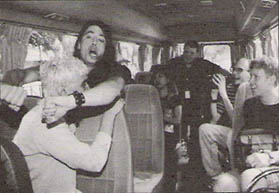 GERRIE: Some people have actually said that you've influenced a lot of young drummers because of your style of playing when you were in Nirvana. Like the way you would use the crash cymbal as a hi-hat, and all that. I'm sure you've heard all this before.
GERRIE: Some people have actually said that you've influenced a lot of young drummers because of your style of playing when you were in Nirvana. Like the way you would use the crash cymbal as a hi-hat, and all that. I'm sure you've heard all this before.
DAVE: (laughs) Yeah. I think that it's important for drummers to take aspects of other drummers and use them. Because you can't put a copyright on sound, you know. Well, you can
but I don't think that that's fair. Because a lot of the things that I do I learnt from the drummer of The Damned, Rat Scabies.
He was one of the first people to do that crash cymbal/hi-hat thing. That's who I learnt that from. And then there was Keith Moon and John Bonham. So you take these things and you Sort of mold them into your own invention and you pass it on. The kick drum I basically learnt from John Bonham, you know.
It's just different things you take from people and you make it your own and then you pass it on to someone else. And I think that's cool. It's like recycling. (laughs)
GERRIE: What is the real story about you nearly joining Tom Petty and the Heartbreakers? Tom Petty reputedly asked you to join after Stan Lynch quit his band? Is that true?
DAVE: Yeah. I only played with them on a television show, Saturday Night Live. I was in the studio recording this album, the Foo Fighters album, and I got a call from someone saying, "Hey, Tom Petty's playing Saturday Night Live and he doesn't have a drummer and he wants you to play drums." My first reaction was, "Why?!!! (laughs) He couldn't find a really good drummer or something? Am I the last resort?" And it turned out that he and the other guys in the band were really big Nirvana fans. So then I was worried that maybe they had watched MTV Unplugged and they didn't know that I actually played really loud. I agreed to do it, of course, because Tom Petty is an incredible guy, and spent a week with them rehearsing and played on the television show. Within that week-and-a-half, they had managed to make me feel like I was part of the band.
And it was the first time I had that feeling since Nirvana. 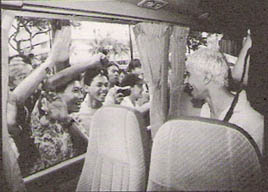 It was just awesome, to have friends you can play music with, to be happy with, you know, to go with to the bar and talk and
then go back and play some more. It was just amazing. I was really this close to doing it. But then, it was a toss-up. I mean, I really had to make a decision - whether I was going to play and do the Faa Fighters thing or to just be a drummer. And I decided that it would be more fun and more challenging to do my own thing than to just play drums.
It was just awesome, to have friends you can play music with, to be happy with, you know, to go with to the bar and talk and
then go back and play some more. It was just amazing. I was really this close to doing it. But then, it was a toss-up. I mean, I really had to make a decision - whether I was going to play and do the Faa Fighters thing or to just be a drummer. And I decided that it would be more fun and more challenging to do my own thing than to just play drums.
GERRIE: What's the future of your label, Roswell Records?
DAVE: Oh, I'm sure that someday when we're not touring all the time, I'll actually focus on releasing albums by bands that I think are important that most major labels don't.
GERRIE: Nothing in the works yet?
DAVE: A little bit, yeah, but I haven't had time to actually solidify any agreements.
GERRIE: Any word on maybe a second Foo Fighters record at this point?
DAVE: Yeah. Hopefully we'll start recording it in the fall and have it out in the spring of next year. We have 16 or 17 new songs that we need to rehearse somewhere other than at sound checks, which is basically where we've been writing all our stuff.
GERRIE: Yeah, what the hell was all that I heard just now (at this afternoon's sound check)? It sounded like just a lot of feedback.
DAVE: (laughs) That was just a bunch of crap. But that's
usually our sound check when all four of us are here. It's spent trying out new arrangements and new ideas.
GERRIE: There's a quote you gave to Rolling Stone, in their recent feature on the Foo Fighters, that struck me and I wanted to round up here by asking you about it. You said that music is a trade-off for the lifestyle that you want to live. And you said, "Music is the only thing that I have extreme passion for."
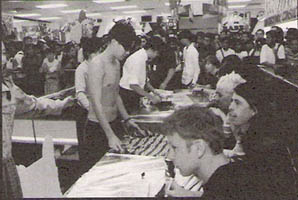 DAVE: Yeah.
DAVE: Yeah.
GERRIE: How do you keep that going? Aren't there days when you feel like, "Shit, I can't deal with this anymore, " or "Maybe I should do something else, " that kind of thing?
DAVE: See, there's a difference between a passion for music and a passion for all the external things that come along with being in a band. I think about music all day long. When I go to sleep, I think about music. I think about new songs, about old songs, about technique, about arrangements. So, it's just something that's built into my brain that I can't stop. But all of the things, whether it's doing interviews or signing autographs or going on tour for eight months or whatever, you have to think of it as a luxury. You really do.
I'm one of the most fortunate people that I know, because I get to do what I love to do, the thing that I love so much and that's so big a part of me, I get to do it whenever I want. And I get to do it all the time.
So, definitely, there is a trade-off. It is a trade-off. If I had to go through all of this to be a construction worker, I'd quit.
It's all for the love of music. Yeah, I get tired, and I get sick of talking to people, but at the same time I sort of love it. Because I like meeting people, I like travelling, and I like playing music, so there's absolutely nothing better in the world than sharing something like this with 2,000 people. It's nice. And it's nice to come somewhere where you can play music, talk to the people, and by the time you leave, you feel like you've made friends.
GERRIE: Where do you think Nirvana would've gone if Kurt hadn't died?
DAVE: That's a question that no one will ever be able to answer. How could you answer that, you know? I always like to say: "If is life's middle name." That's a joke, but, you know, who knows? You never know.
I'm not one for speculation because, a lot of the time, speculation destroys expectation.
So it's better just to live your life day by day and respect the past and learn from it and keep on moving. Because if you're lucky, you get to live to be 80 or 90 years old. If you're lucky. So I'm 27 now. So that gives me like another 55 summers, another 55 Christmases, another 55 Easters, things like that.
Life's too short to dwell on it. .